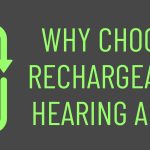Hearing aids do a lot for those of us with age-related hearing loss. They help us to feel more confident and optimistic. They help us avoid accidents. They keep us in the conversation with friends and loved ones. Using Bluetooth technology, hearing aids can even help us to stay better-connected to those who are far away through video chats and crystal-clear phone calls.
Hearing loss is one of the most common problems we experience as we get older. Of those aged 60–69, about one-third have hearing loss. By age 70 and up, about two-thirds of people have hearing loss. Almost all centenarians have hearing loss, suggesting we will all experience it if we only live long enough. And new research suggests that hearing aids may significantly increase our chances of living to 100 or beyond.
A Study On “Cognitive Super-Agers”
A study from the Netherlands sought to understand the brains of what researchers call “cognitive super-agers.” These are people who reach the upper limit of the human lifespan with the brain function of someone much younger. Scientists hope that by studying centenarians today, we may one day reach a point where everyone who can physically live to 100 can be sure to remain mentally healthy, as well. Until then, their research has discovered some lifestyle choices we can make to ensure our best chances of keeping our brains in good shape, however long we may live.
The study, published in JAMA Network Open this year, was conducted by a team at Vrije University in Amsterdam. They followed 340 Dutch centenarians who were tested to be cognitively healthy at the start of the study. Of the 79 participants who remained in the group for the 19-month duration of the study, none of them experienced any decline in cognitive function, with the exception of a slight loss in memory function.
About one-third of the participants agreed to donate their brains at the end of their lives. Amazingly, some of the brains autopsied showed the characteristic plaques, tangles, and other damage associated with Alzheimer’s disease, though these people never experienced dementia.
Resistance and Resilience
The two ways a person might avoid dementia associated with Alzheimer’s are “resistance” and “resilience.” Resistance indicates an absence of brain damage. It may come from genes, lifestyle, or some other biological mechanism that prevents Alzheimer’s from causing physical changes in the brain.
Resilience, however, describes a person with normal cognitive functioning, even though their brain has all the physical signs of Alzheimer’s. It’s not that someone with resilience to Alzheimer’s will never experience dementia, but that Alzheimer’s has to cause more damage for symptoms of dementia to appear. Resilience can allow someone who is genetically very likely to have Alzheimer’s disease to still experience normal cognitive functioning through to the end of their life.
How To Increase Resilience To Alzheimer’s Disease
Dementia is not an inevitable part of aging, even for those who are likely to have Alzheimer’s. Those who are likely to be resilient to it tend to do the things we know are part of a healthy lifestyle:
Exercise regularly
Maintain a healthy weight
Don’t smoke
Avoid red meat
Keep using your brain!
The last of these is incredibly important. It can involve reading periodicals every day, learning a new language, learning to play a new musical instrument, or any other mentally challenging task.
Hearing aids are crucial. They help us stay in touch with the world around us, which keeps our brains busier than just about anything else. Hearing loss is one of the main drivers of cognitive loss, and it leads the list of 12 modifiable risk factors for dementia. Hearing aids help keep us more socially and physically active, as well, which also reduces our risk for dementia.
Untreated hearing loss cuts us off from the sounds around us, which ultimately cuts us off from the people around us. Social activity is one of the biggest, easiest, and most satisfying ways we can use our brains. When we engage with others, all parts of our brain light up and go to work as we listen to them, speak in our turn, read facial expressions, and more. Hearing aids make this possible even with severe hearing loss.
If you or a loved one is living with untreated hearing loss, make an appointment for a hearing test today and learn about what hearing aids can do to help keep you healthier and happier!






